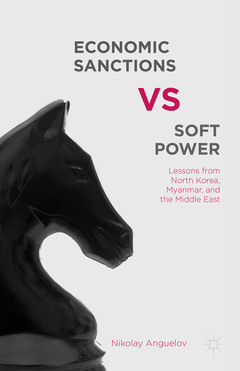Description
Economic Sanctions vs. Soft Power, 2015
Lessons from North Korea, Myanmar, and the Middle East
Author: Anguelov N.
Language: English
Subjects for Economic Sanctions vs. Soft Power:
Keywords
Economic Sanctions; Soft Power; Political Rents; FDI; North Korea; Policy
Approximative price 94.94 €
In Print (Delivery period: 15 days).
Add to cart
Publication date: 07-2015
192 p. · 14x21.6 cm · Hardback
192 p. · 14x21.6 cm · Hardback
Description
/li>Contents
/li>Biography
/li>
The book examines the industrial growth of sanctioned nations in terms of their ability to foster trade partnerships with countries that choose to evade or not comply with sanctions. When those "black knight" nations find strong local market competitive advantages in the absence of firms from sender nations, incentives develop to support local political status quos. For those reasons, the political resilience of rogue and repressive regimes is analyzed in terms of their economic incentives to remain repressive. The resilience is based on the fact that the local politicians are also the local businessmen. Through the growth of international production networks, their business opportunities augment and the rents associated with that growth also increase. As business opportunities grow in the absence of competition, so does the amount of rent extraction and protection. Rent protecting leads to strengthening economic and political leadership, because the wealth is used for creating further rents by providing economic benefits to the regime supporters. Economic Sanctions vs. Soft Power shows how the system of self-enforcing economic rents builds political rents and lowers opportunities for the development of viable political oppositions.
Introduction 1. Economic Sanctions: An Overview 2. Myanmar Twenty Years of Sanctions and their lasting Effect 3. Myanmar's Sanction Legacy: The Results of Non-Engagement 4. Absorb and Control: How North Korean Responds to Economic Sanctions 5. Alternatives to Sanctions 6. Sanctions or Soft Power: Implications for Competitiveness 7. Engage or Not? Conclusions and Policy Implications References
Bradley J. Hornback Tiffany Kaschel
© 2024 LAVOISIER S.A.S.
These books may interest you

Banking and Economic Rent in AsiaRent Effects, Financial Fragility, and Economic Development 48.88 €



